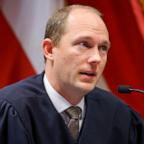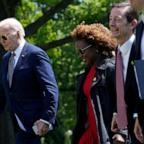Should 'Dirty Bomb' Suspect Get Trial?
— -- ACLU Urges Trial for ‘Dirty Bomb’ Suspect
N E W Y O R K, Sept. 27 — The American Civil Liberties Union filed legalpapers urging that a former Chicago gang member accused of plottingwith terrorists to detonate a radioactive dirty bomb be tried incourt.
In papers filed Thursday in U.S. District Court, the civilrights organization said "precedent and principle" require thatJose Padilla be tried in court, with a lawyer representing him,rather than held indefinitely as an "enemy combatant."
"The higher the stakes, the more important it is to ensure thatthe government does not act arbitrarily or in error," the ACLUwrote.
Padilla, 31, was arrested May 8 and secretly held in a federaljail on a material witness warrant issued by a New York grand jury.The government said Padilla twice met with senior al Qaedaoperatives in Karachi, Pakistan, in March and discussed a plot todetonate a radiological weapon in the United States.
On June 9, President Bush decided that Padilla was an enemycombatant and should be transferred to the control of the U.S.military. He was flown the next day to a Navy brig in Charleston,S.C.
Padilla's lawyer, Donna Newman, has argued in court that he isbeing held illegally and should be released.
—The Associated Press
FBI, CIA Offer No Apologies for Pre-9/11 MistakesW A S H I N G T O N, Sept. 27 — They came to Capitol Hill following reportswith how their agencies kept missing clues and warning signs aheadof the Sept. 11 attacks.
But CIA Director Cofer Black and Dale Watson, who oversawcounterterrorism efforts of the CIA and FBI, respectively, offeredno apologies.
They said their agencies did the best they could with inadequatestaffing, tight budgets and legal restrictions.
"Our people fought with what was provided them," Black toldthe House and Senate intelligence committees Thursday.
The committees are conducting an inquiry into the attacks.
The difficulties of stopping the attacks were described inwritten testimony by FBI Director Robert Mueller, who said there'sno evidence anyone outside the 19 hijackers knew of the plot.
His testimony was offered in closed session in June and releasedThursday.
Mueller offered the caveat that he wasn't discussing the case ofZacarias Moussaoui, the suspicious student pilot who faces chargesof conspiring in the attacks.
"Discipline never broke down. They gave no hint to those aroundthem what they were about. They came lawfully. They lived lawfully.They trained lawfully. They boarded the aircraft lawfully," hesaid.
One hijacker, Nawaf al-Hazmi, even reported an attempted streetrobbery to police in Fairfax, Va., on May 1, 2001, but laterdeclined to press charges, Mueller said.
The U.S. government placed Al-Hazmi, who had suspected terroristconnections, onto a watchlist to deny him access to the country onAug. 24, 2001. Three days later, Al-Hazmi used a debit card in hisown name to buy tickets for the flight that crashed into thePentagon, Mueller said.
In reports over the last two weeks, Eleanor Hill, the inquirystaff director, outlined many missed opportunities which, ifconnected, might have caused the Sept. 11 plot to unravel.
They include a rise in intelligence reports about a possibleattack, a memo by a Phoenix FBI agent warning that al Qaeda may besending terrorists to U.S. flight schools, the arrest of Moussaouiin Minnesota, and the realization that two men linked to al Qaedain January 2000 may be in the country. They turned out to be amongthe hijackers.
The official said these clues were among thousands othersoffering a variety of scenarios for possible attacks at home andabroad.
Watson, retiring from his post as chief of the counterterrorismdivision, compared it to a maze.
"If you know where the end point of a maze is, it's certainlyeasier to work your way back to the starting point," he said. He said counterterrorism will never be perfect.




